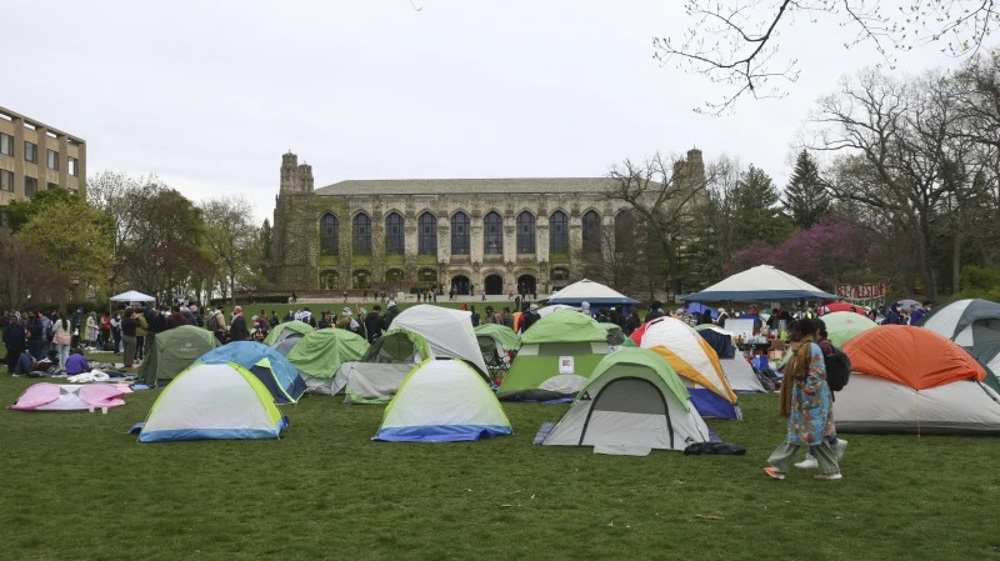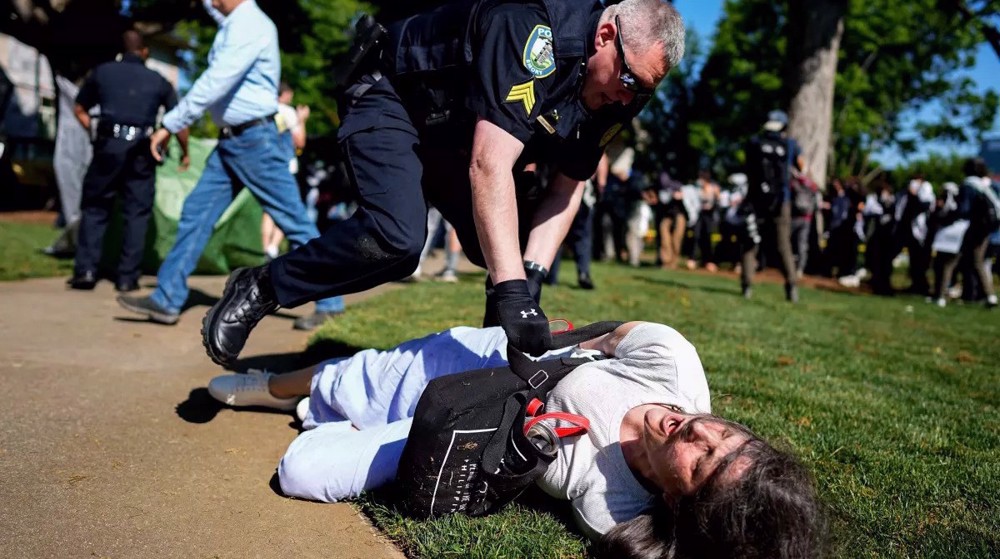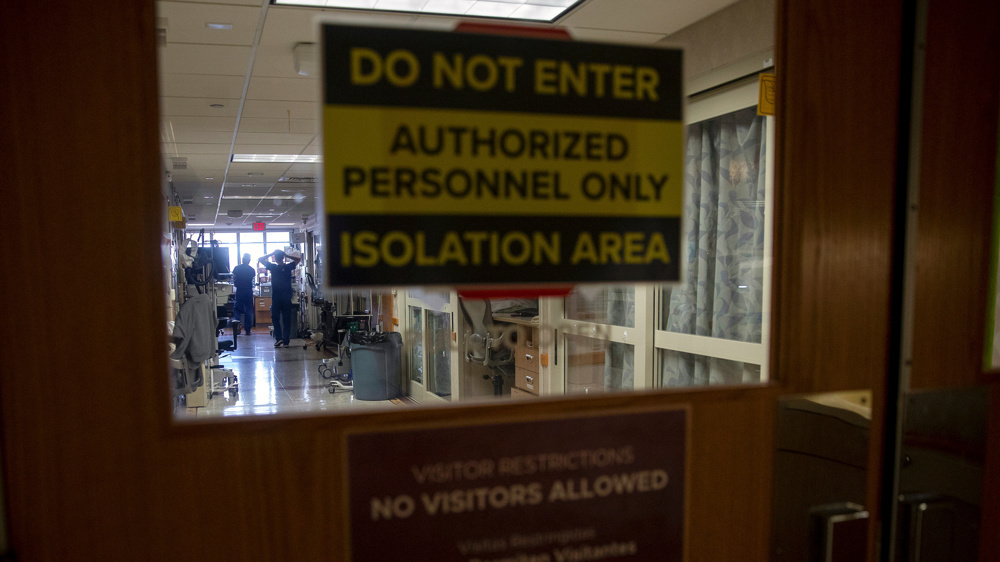US vaccinations underway at slow pace as cases of COVID-19 surge
With cases of coronavirus infection surging across the United States, the state of Tennessee has been emerged alongside California as a new epicenter of the virus outbreak, which has so far claimed the lives of over 326,000 Americans and infected more than 18 million nationwide.
Tennessee averaged nearly 128 new infections per 100,000 people over the last week, the highest of any state across the US, according to US Centers for Disease Control and Prevention (CDC) data.
Governor Bill Lee urged people to wear face masks and gather only with members of their own household over Christmas.
“Our state is ground zero for a surge in COVID-19 and we need Tennesseans to (do) their part,” he said.
California stood second at 111 new cases per 100,000 residents.
The latest nationwide explosion in cases has brought hospitals under strain in California and many parts of the US.
Officials in California are opening field hospitals and seeking additional health-care workers to handle the record number of patients.
Across the country, states reported that more than 119,500 people were hospitalized with COVID-19, according to Washington Post tracking.
A day earlier, that figure was just under 118,000, the data showed.
On Wednesday, health officials recorded 3,379 coronavirus related deaths — the second highest number of coronavirus fatalities in the US.
This is while, US deadliest day of the pandemic — December 17 — saw 3,406 COVID-19 deaths.
US health officials say traveling and gathering for Thanksgiving contributed to the latest surge in cases, warning that further holiday celebrations will exacerbate the situation.
US vaccinations underway at very slow pace
The US has kicked off vaccinations against the disease, with some one million people having received a first dose of the vaccine, according CDC Director Robert Redfield.
Two doses of the Pfizer-BioNTech COVID-19 vaccine are required for inoculation.
Over 9.5 million doses of vaccines have now been sent to states, according to the CDC.
Hospitals said the first COVID-19 vaccinations started slowly last Monday as they navigated preparing the previously frozen shots for use, finding employees to run the vaccination clinics, and ensuring proper social distancing both before and after vaccination. Some said they did only about 100 shots the first day.
The slow pace of the vaccination has cast doubt on the government’s plans to vaccinate 20 million people by the end of the year.
“The commitment that we can make is to make vaccine doses available,” US Operation Warp Speed chief adviser Moncef Slaoui said Wednesday.
He noted the rate of people getting a shot in their arm is “slower than we thought it would be.”
While front-line healthcare workers were expected to be among the first to receive the long-awaited vaccine, US political leaders are now seen putting themselves at the front-line for receiving the life-saving shots.
Health and Human Services Secretary Alex Azar and Anthony Fauci, the top US infectious disease official, received the Moderna vaccine on live television on Tuesday.
President-elect Joe Biden also received a Pfizer/BioNTech shot in front of cameras on Monday.
US Democratic lawmaker Ilhan Omar criticized political leaders earlier this week, saying, “We are not more important than frontline workers, teachers etc. who are making sacrifices every day. Which is why I won’t take it.”
New York City reports first case of allergic reaction to vaccine
Since immunizations began last week, six people have been reported to have severe allergic reactions, known as anaphylaxis, according to the CDC.
An anaphylactic reaction, which develops quickly, is potentially life-threatening. But it can be quickly halted with medicines such as epinephrine.
On Wednesday, one health care professional experienced a “significant allergic reaction” in New York.
The New York City Department of Health and Mental Hygiene said it has “received a single report of a serious adverse event in a health care worker.”
“Vaccines do have side effects and allergic reactions - while uncommon - are known to occur,” it added.
Authorities said they are planning a study to find out why the allergic reactions are happening after receiving the shots.
The study, which is still in the early planning phases, is expected to include “several hundred” people who have a history of severe allergic reactions, said Alkis Togias, chief of the NIAID’s Allergy, Asthma, and Airway Biology Branch.
Last week, two healthcare workers developed the allergic reactions at a same hospital in Alaska.
The staff, one of whom remained at hospital for the night, started to develop reactions just minutes after receiving the FDA approved vaccine.
According to US Food and Drug Administration, Moderna’s vaccine causes some rare symptoms such as intractable nausea or vomiting and facial swelling.
Some common side effects were also reported including, fatigue, headaches and muscle pain.
President-elect Joe Biden has made a fresh attempt to fill the Trump leadership vacuum that is especially in evidence over the COVID pandemic and a recent hack of the US government.
Biden warned that, despite the hype of Trump's team, groundbreaking vaccines were in short supply and would take "many more months" to become available to most Americans. He warned that tens of thousands more Americans will die, in a kind of message never adopted by Trump.
"I'm going to tell you the truth. And here's the simple truth: Our darkest days in the battle against COVID are ahead of us, not behind us," Biden said in Wilmington, Delaware.
VIDEO | London remembers 1948 ethnic cleansing of Palestinians
Netanyahu prefers own interests to Israeli forces’ lives: Hamas
800k Palestinians forced to flee Rafah amid Israel invasion: UNRWA
VIDEO | Spain must break relations with Israel, protesters chant in Madrid
VIDEO | Israeli divisions over Gaza
UN chief renews call for two-state solution, calls Gaza war ‘open wound’
VIDEO | London protests: Tens of thousands reiterate calls for ceasefire in Gaza
Iran clinches 2024 Asian Taekwondo Championships in Vietnam














 This makes it easy to access the Press TV website
This makes it easy to access the Press TV website